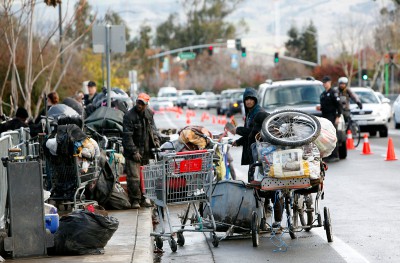More than 350 homeless Americans lived in their makeshift village, ‘The Jungle’ in San Jose, California – that is, until police and social services raided the camp, evicting tenants and destroying their self-made homes on Thursday.
Evicted homeless people lined the sidewalk along Story Road, clutching shopping carts filled with their meager possessions as they watched city workers literally rip apart their community. Some wept uncontrollably, as they asked: Where will we go now?
“I don’t know,” answered 37-year-old Toi Larks-Scott, standing barefoot in the muddy parking lot, holding the leash of one of her two dogs. Nearby, eight carts were laden with her belongings.
“I don’t understand this. It’s not illegal to be homeless. This isn’t right.”
But increasingly, particularly in gentrified San Francisco, it actually is illegal to be homeless.
The newly evicted residents line the street with their carts of possessions (Image via Mercury News)
The newly evicted residents line the street with their carts of possessions (Image via Mercury News)
While homeless shelters and welfare programs continue to be cut, homelessness is criminalized across the country. In many cities, it is now illegal to sleep in your car or sit/recline in a public place, it is illegal to feed homeless people, and public buildings are putting in spikes and cages to keep homeless people from using flat surfaces or heating vents to make themselves slightly more comfortable through those long, cold, nights.
Nowhere is the divide sharper than in Silicon Valley, where ‘The Jungle’ was nestled just a stone’s throw away from the tech giants of Google, Apple, Yahoo, and eBay. The influx of wealthy tech executives has seen existing residents priced out of their own cities.
Rents are soaring year on year, rising 7% in nearby San Francisco last year alone. This has priced out many low and middle earners and seniors from the area, while apartments are now 18% smaller than they were a decade ago. Landlords across Silicon Valley are using the gentrifier’s loophole, the 1986 Ellis Act, to kick sitting tenants out in order to cash in on the tech boom. The Ellis Act allows landlords to evict tenants if they are getting out of the rental business. More than 4,000 people have been turfed out of their homes since 1997 under the Act.
Yet despite this unfolding housing crisis, State Sen. Mark Leno was recently forced to abandon a bill aimed at curbing the number of Ellis Act evictions in San Francisco due to a lack of support.
A chunk of those people made homeless by the gentrification stayed homeless, and some of them ended up in ‘The Jungle’. The wealthy neighbors of the 68 acre shanty town quickly became frustrated by having to look upon the physical manifestation of the housing problem they caused – and so decided to get rid.
At 8 a.m. on Thursday, December 4, 2014, bulldozers and trash compactors rolled into ‘The Jungle’ while dozens of police officers dragged tenants from their homes and workers wearing protective white suits began breaking down camp sites and makeshift structures.
Eva Martinez, 63, and Grace Hilliard, 59, are two close friends who both have health problems – heartbroken by the idea that they were going to be separated.
“This is very devastating,” said Hilliard, who has lived on and off at the Jungle for 16 years.
Martinez could barely speak.
“This is my home,” she said quietly. “Now I’ll have to lay down on the street, somewhere outside. I couldn’t bring out all of my stuff. The rest will end up in the Dumpsters, I guess. It’s terrible. It’s terrible for all of us.”
Ray Bramson, the city’s homeless response manager, said:
“This site is no longer open for any individuals,” Bramson said. “The fact that anyone has to live in conditions like this is horrible. This shouldn’t be a viable alternative for anyone. We need to make sure that people never have to live in a place like this.”
Social services workers had warned people that they needed to leave the camp even as they told them there was “nowhere for them to go.” City spokesman David Vossbrink admitted that it was unlikely that all of the residents forced out today could be relocated.
With around 5,000 people sleeping rough on the streets of San Jose streets on any given night, the reality is that the destruction of ‘The Jungle’ has just removed a much needed place of refuge.
Protesters were trying deliver this message on Thursday as they held signs like “This is no solution” and chanted “Housing, not Dumpsters!”

